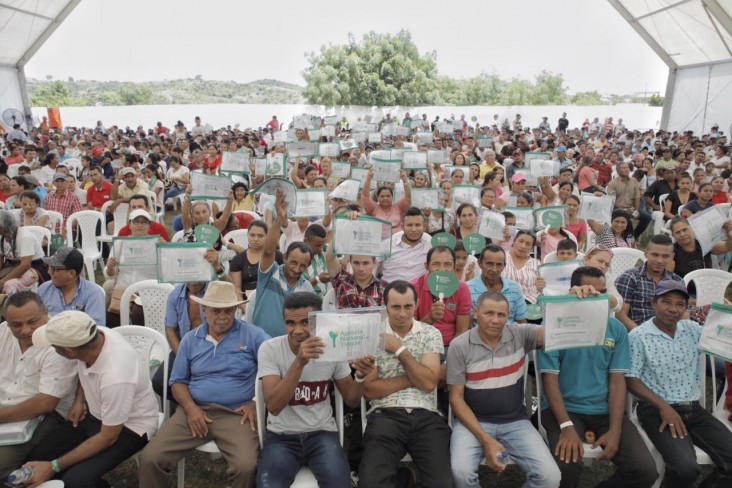Speeches Shim

By Marcela Chaves
Imagine the following: for decades, you live in a region plagued by violence and disappearances. You live on a piece of land that was given to you by your parents, that you settled with your family, or that you purchased. This land is your only means of income. The state has never provided any land title to acknowledge your rights. Yet when the violence intensifies, your instincts of self-preservation tell you to leave it all behind or lose your life. You join a multitude of victims, carrying what you can on your back. You lie to your children; you believe you’ve lost your land. Finally, your government is so enfeebled and is facing many challenges that it cannot provide solutions.
Millions of Colombia’s rural citizens are real characters in this story. An estimated 50 percent of rural parcels lack formal land titles, exacerbating the struggle of making decisions in the middle of an ongoing violence. Financial services and government services are often unavailable without titles. Urban cities receptors of displaced families do not have the capacity to provide services or assistance and farmers are loath to invest in informally owned land. Without a title, land is worth well below market values——and the lack of state presence attracts groups trying to expand illegal crops. Afro-Colombians, the indigenous, and the poor are the most vulnerable.
The people are the first to come to mind, but land informality also affects the state’s ability to transform rural areas into thriving economies and puts private sector investments at risk. In other words, land informality hampers any chance of sustainable socio-economic development. Does the government want to invest in a rural school that might be on somebody’s land or finish a tertiary road without policies for land-use conversion? Does a chocolate company want to invest in cacao growers without property titles?
The answer is no—but simple land administration could change that. Sound, equitable land policy is at the heart of the solution and could prevent these issues. Strengthening land policies and institutions require a well-orchestrated effort from all of Colombia’s stakeholders.
The Aid Paradigm Shift
In order to address longstanding land issues, USAID has rallied the national and regional governments, private sector, producers’ associations, and others to support an integrated transformation.
Since 2011, USAID has supported institutional arrangements to carry out a decade-long land restitution route for displaced people to recover their land. Since 2014, USAID has supported the state to advance more than 5,250 cases, helping the Land Restitution Unit increase case processing and subnational governments better comply with the restitution rulings.
USAID has created 10 municipal land offices, equipping local governments with the tools to advance urban titling and support rural titling. These offices have already issued over 1,200 titles, necessary for schools and clinics to access funds for public services. Through these offices, municipal governments have begun to increase land taxation, allowing them to provide needed services and take a step towards self-reliance. For the first time, local leaders are taking the lead in property rights administration.
In addition, the state has piloted a massive land formalization and cadaster activity, adapting tools and skills to the Colombian reality, and formalizing thousands of properties at a time. With this support, the Government of Colombia (GOC) is able to collect inputs based on proof of concept and land policy realities in Colombia to simplify processes and scale cadaster and land titling. To support land administration, USAID supported the digitization of 5.4 million property related archives.
To increase the practicality of land titles, USAID facilitated 15 public-private partnerships valued at more than US$30 million, with commitments from the public sector to deliver skills and technology to farmers, most of whom are victims. The private sector is also putting up capital and cutting out intermediaries through purchasing contracts. USAID is the silent partner, refraining from donations and handouts.
These efforts are all intended to advance peace and legality in regions targeted jointly by USAID and the GOC.
| USAID's Support by the Numbers (2014 - 2019) | |
|---|---|
| Land Restitution Cases: | 5,249 |
| Land Titles: | 3,377 |
| Digitized Property Files: | 5.4 million |
| Mobilized Resources: | US$73 million |
| Public-Private Partnerships: | 15, valued at US$30 million |
| Information Systems in place: | 53 |
| Municipal Land Offices: | 10 |
| Urban Land Titles Issued through Municipal Land Offices: | 1,235 |
The Power of Information
USAID expertly uses technology to democratize information among government agencies. Over five years, Colombian leaders mobilized more than US$73 million using USAID supported tools and methodologies. It is impossible to update the rural cadaster and deliver land titles to an entire municipality without dozens of new information systems in place. Responding to land restitution requests in record time without the Land Node, a data-sharing network across several agencies, would remain cumbersome. Without information, regional governments are unable to mobilize rural development investments.
Instead of direct implementation, USAID is demonstrating that investments are more strategic and sustainable when working with Colombian stakeholders to adapt new technologies and sharpen its focus on property and land use. Instead of paying for land titles, donors should support capacity building efforts that can be sustained by future leaders, because this development model is proven to deliver results and builds a culture of self-reliance within the government.

Comment
Make a general inquiry or suggest an improvement.